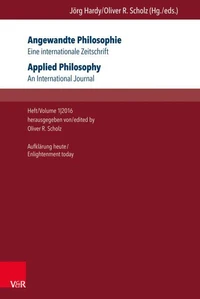Urteil und Erfahrung. Kants Theorie der Erfahrung. Erster Teil
Par :Formats :
Disponible dans votre compte client Decitre ou Furet du Nord dès validation de votre commande. Le format PDF est :
- Compatible avec une lecture sur My Vivlio (smartphone, tablette, ordinateur)
- Compatible avec une lecture sur liseuses Vivlio
- Pour les liseuses autres que Vivlio, vous devez utiliser le logiciel Adobe Digital Edition. Non compatible avec la lecture sur les liseuses Kindle, Remarkable et Sony
 , qui est-ce ?
, qui est-ce ?Notre partenaire de plateforme de lecture numérique où vous retrouverez l'ensemble de vos ebooks gratuitement
Pour en savoir plus sur nos ebooks, consultez notre aide en ligne ici
- Nombre de pages295
- FormatPDF
- ISBN978-3-647-23013-9
- EAN9783647230139
- Date de parution20/05/2015
- Protection num.pas de protection
- Taille2 Mo
- Infos supplémentairespdf
- ÉditeurVandenhoeck & Ruprecht
Résumé
This study shows the inner workings of Immanuel Kant´s Theory of Experience. Kant investigated what the cognitive necessities are for humans to make objective and true judgments, so-called empirical judgments. He asks why such judgments can be objectively true even though they are based on a subjective and relative basis. In this volume the author follows Kant´s methodological path to his final goal: determining the complex deep structures behind simple empirical judgments, such as "The sun is warming the rock, " and showing the extent to which the objective truthfulness of such judgments depends on these deep structures.
This is the first of two volumes on Kant´s Theory of Experience.
This is the first of two volumes on Kant´s Theory of Experience.
This study shows the inner workings of Immanuel Kant´s Theory of Experience. Kant investigated what the cognitive necessities are for humans to make objective and true judgments, so-called empirical judgments. He asks why such judgments can be objectively true even though they are based on a subjective and relative basis. In this volume the author follows Kant´s methodological path to his final goal: determining the complex deep structures behind simple empirical judgments, such as "The sun is warming the rock, " and showing the extent to which the objective truthfulness of such judgments depends on these deep structures.
This is the first of two volumes on Kant´s Theory of Experience.
This is the first of two volumes on Kant´s Theory of Experience.






